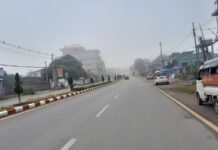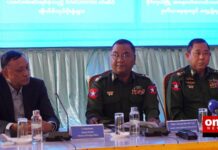 The United Nationalities Federal Council (UNFC) failure to attend the framework for political dialogue was speculated and interpreted as either the rejection, due to the lack of response on its eight point proposal earlier, or also a genuine worry of a single day allotment – reportedly on the 15 September, before the amendment on Framework for Political Dialogue (FPD) – to discuss the proposal by the government side might be too short a time and thus, decided not to go to the meeting that was held from 16 to 17 September. The UNFC was said to have given reason that it has time constraint, as its members must discuss and inform their leadership and basis on the 21st Century Panglong (21CPC) or Union Peace Conference (UPC), which they have just recently attended from 31 August to3 September, although it was believed to be otherwise.
The United Nationalities Federal Council (UNFC) failure to attend the framework for political dialogue was speculated and interpreted as either the rejection, due to the lack of response on its eight point proposal earlier, or also a genuine worry of a single day allotment – reportedly on the 15 September, before the amendment on Framework for Political Dialogue (FPD) – to discuss the proposal by the government side might be too short a time and thus, decided not to go to the meeting that was held from 16 to 17 September. The UNFC was said to have given reason that it has time constraint, as its members must discuss and inform their leadership and basis on the 21st Century Panglong (21CPC) or Union Peace Conference (UPC), which they have just recently attended from 31 August to3 September, although it was believed to be otherwise.
According to the UNFC Joint General Secretary Twan Zaw: “The government has started inviting Ethnic Armed Organizations (EAOs) to the meeting on reviewing the framework (for political dialogue). We have been invited to attend the meeting, which will be held from the 15 to 17 (September). We replied that the time is not right for us now. We have to submit reports to our respective headquarters after the 21st Century Panglong Conference. At the same time, there are also eight demands we have made concerning the Nationwide Ceasefire Agreement (NCA). The government has agreed to continue discussing these demands so we want to discuss them first.”
The UNFC eight point proposal that should be added to the NCA are:
- Bilateral ceasefire agreement between the government-military and the UNFC;
- To build a federal union with result achieved from 21CPC;
- Agreement of tripartite dialogue composition;
- Drafting and promulgation of constitutional law based on the outcome of 21CPC;
- Advance agreement on Military Codes of Conduct (CoC) and monitoring on Terms of Reference (ToR);
- Formation of military Joint Monitoring Committee (JMC) with representatives from government, EAOs and international figures acceptable to both parties;
- Formation of a neutral, enforcement tribunal for NCA involving domestic and international law experts and judges that are acceptable to both parties; and
- Developmental projects to be tackled according to Extractive Industries Transparency Initiative (EITI), in cooperation with the public and the EAOs. (Source: UNFC Documentation)
The UNFC seems to be banking on levelling the political playing field through implementation of genuine nationwide ceasefire, so that it could participate in the 21CPC without going through the signing of NCA, which it is keen to amend for the document doesn’t fully caters to its aspirations.
Given that the NCA is being endorsed by the parliament during Thein Sein regime last year and also explicitly taken over by the National League for Democracy (NLD) regime, there is little chance that it would be amended. Besides, regarding the bilateral ceasefire agreement proposal, Dr Tin Myo Win, top peace negotiator of State Counsellor Aung San Suu Kyi, has officially replied that the military won’t be going along, as it had also not done this when the 8 EAOs signed the NCA, on 15 October 2015.
The present situation now could be that the UNFC would either disregard the FPD amendment invitation of the government and opted out of the peace process or join the government prescribed scheme without much fuss. But as the government has been aggressively pushing the non-signatory EAOs politically and militarily to sign the NCA, just the opposite, with the determination to resist the pressure, seems to be gaining ground among the UNFC members.
The military has been coming down hard on the Kachin Independence Army (KIA) with military offensives since the end of 21CPC and sending reinforcement into Shan State Progress Party/Shan State Army (SSPP/SSA) controlled areas threatening to attack, both of which are hard core UNFC members.
As neither side seems to be giving in, a temporary solution is needed. And that would be at least the military agreeing to the bilateral ceasefire agreement declaration first, followed by negotiation process on sticky topics like tripartite dialogue, federal union formation and other debatable issues that would take more time to work out.
And if initial agreement could be negotiated during the FPD amendments or fine-tuning, the NCA could be altered and incorporated with facts achieved from it. And at the same time, allowing the non-signatory to participate in the state-level political dialogue, while gearing up for the forthcoming UPC, which will be held within six months.
The military faction advocated line that all non-signatory EAOs have to sign the NCA first, before being allowed to participate in state-level political dialogue, should be shelved, not to torpedo the whole peace process immediately that would bring all to a stalemate or square one.
Meanwhile, the UNFC and 8 EAOs that signed the NCA will meet from 26 -30 September, probably to discuss on how the EAOs as a whole should go about with the 21CPC.
“Well begun is half done” motto actually should be the guideline, but instead Suu Kyi has waded into the peace process hurriedly, against all suggestions. She reasoned that peace has no time to wait and that she and her party were fighting against time constraint and odds to do it, whatever she really meant to say by that. But the real reason might be her timing to coincide with her Europe and United States visits following the 21CPC grand opening, which would put her in favourable international limelight, especially when she is positioned to give her first speech at the United Nations General Assembly.
The 21CPC recently held was just an opening, which basic necessities like altering FPD and possible amendments of the NCA need to be adequately addressed involving the non-NCA signing EAOs, which formed the majority of 13 to just 8 EAOs signed.
The main concern of the whole peace process is all-inclusivity of all EAOs in the first place and this has also not been able to achieve, as the military was able to block it by excluding the 3 EAOs that it harbours animosity. And this has been the core point that made the UNFC not to sign the NCA. But if the 21CPC is to be an all-inclusive one, the military and government would have to let the excluded EAOs come in.
And only after this agreement, the amendments of FPD and eventually the NCA, that is acceptable to all EAOs, could be worked out. Then the signing of NCA could follow, leading to the UPC or 21CPC.
But the 21CPC was opened without necessary preparation and thus, in effect, could be said that it is “the cart before the horse” sort of undertaking.
The worst thing is that the NCA amendment proposal of the UNFC is still hanging in the air, which the government and military so far refused to agree to. And without amendments there is no way that the UNFC would ink the document.
To sum up the situation, sooner than later, a decision have to be made if the government, or better Suu Kyi, is going to be accommodative to the UNFC proposal or will opt for the military suggested trend of exclusion, side-lining the 3 EAOs and refusing to amend the NCA.
If Suu Kyi’s choice is the former the EAOs will prevail and the all-inclusive peace process could go on, if the latter, the military will be the winner and we all could as well kiss goodbye to the all-inclusive political participation, durable ceasefire agreement that would lead us to political settlement and lasting peace.











Leave a Comments